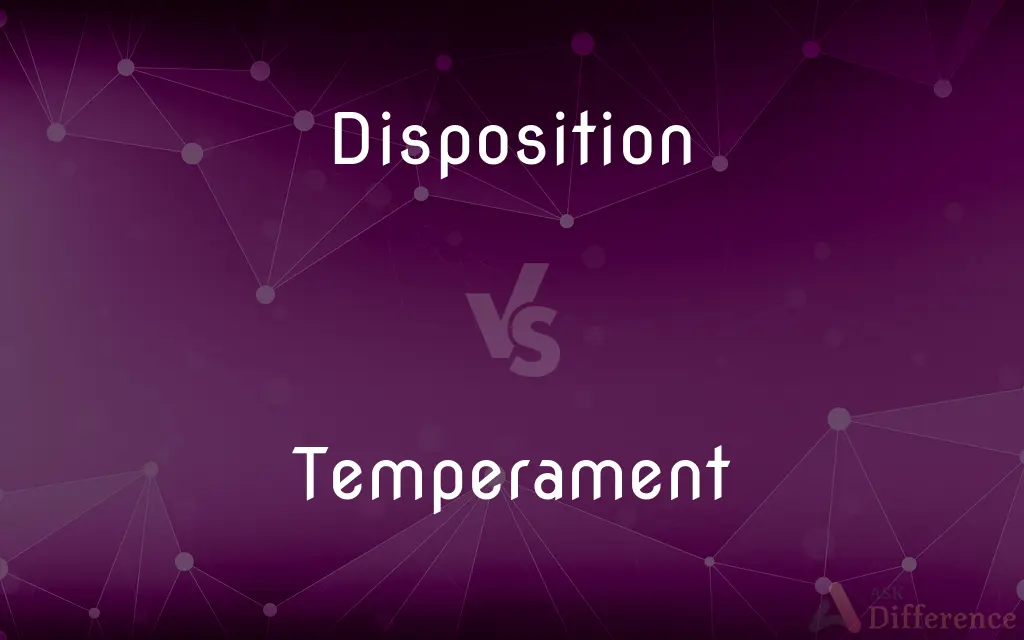Disposition vs. Temperament — What's the Difference?
Edited by Tayyaba Rehman — By Urooj Arif — Updated on March 12, 2024
Disposition reflects an individual's inherent qualities of mind and character, focusing on attitude and inclinations, while temperament relates more to their emotional and behavioral tendencies, often seen as innate.

Difference Between Disposition and Temperament
Table of Contents
ADVERTISEMENT
Key Differences
Disposition involves a person's usual mood and attitude towards various situations, indicating how they are likely to react or behave. It encompasses their general outlook and manner in dealing with life's events. On the other hand, temperament refers to the biological aspect of an individual's personality, grounded in genetics and early development, influencing their emotional responses and the intensity of those responses.
Disposition is often seen as malleable and influenced by external factors such as environment, experiences, and education. It denotes a person's predisposition to act or feel in a certain way. Whereas temperament is considered more innate and stable over time, forming the foundation of one's personality and significantly affecting interpersonal interactions and relationships.
In terms of assessment, disposition can be somewhat easier to modify through interventions such as therapy, education, or life experiences. It's about the "nurture" aspect of the nature vs. nurture debate. On the other hand, temperament, deeply rooted in the "nature" side, is less susceptible to change, with its core elements remaining consistent throughout life.
Disposition often encompasses a broader range of characteristics, including one's tendency towards optimism or pessimism, flexibility, and their method of approaching tasks. In contrast, temperament focuses on more specific emotional and behavioral patterns such as sensitivity, reactivity, and the ability to regulate attention and emotions.
While disposition might be described in terms such as friendly, cautious, or ambitious, reflecting how individuals interact with their surroundings, temperament is often categorized into types like sanguine, choleric, melancholic, and phlegmatic, each with distinct emotional and behavioral profiles.
ADVERTISEMENT
Comparison Chart
Definition
Inherent qualities of mind and character, focusing on attitude and inclinations.
Emotional and behavioral tendencies, often considered innate.
Influences
Environment, experiences, and education.
Genetics and early development.
Stability
More malleable and subject to change.
Relatively stable and consistent throughout life.
Focus
General outlook and manner in dealing with life's events.
Specific emotional and behavioral patterns.
Examples
Friendly, cautious, ambitious.
Sanguine, choleric, melancholic, phlegmatic.
Compare with Definitions
Disposition
A person's inherent qualities of mind.
Jane's sunny disposition made her loved by all.
Temperament
A person's or animal's nature that affects their behavior.
The dog's gentle temperament makes it a great family pet.
Disposition
Tendency to act or feel in a particular way.
Her disposition to help others is admirable.
Temperament
The innate aspect of an individual's personality.
Her artistic temperament is reflected in her passionate performances.
Disposition
The usual attitude or mood of a person.
His calm disposition helps him in tense situations.
Temperament
A characteristic pattern of emotional responses.
His fiery temperament is well-known in the industry.
Disposition
A person's characteristic approach to life's events.
His thoughtful disposition is evident in his decisions.
Temperament
The tendency towards a particular mood.
His melancholic temperament gives his music a deep emotional quality.
Disposition
The way someone is likely to react.
Her disposition towards caution often saves her from trouble.
Temperament
Innate behavioral tendencies.
The child's lively temperament is evident in his playful interactions.
Disposition
A disposition is a quality of character, a habit, a preparation, a state of readiness, or a tendency to act in a specified way that may be learned. The terms dispositional belief and occurrent belief refer, in the former case, to a belief that is held in the mind but not currently being considered, and in the latter case, to a belief that is currently being considered by the mind.
Temperament
In psychology, temperament broadly refers to consistent individual differences in behavior that are biologically based and are relatively independent of learning, system of values and attitudes. Some researchers point to association of temperament with formal dynamical features of behavior, such as energetic aspects, plasticity, sensitivity to specific reinforcers and emotionality.
Disposition
A person's inherent qualities of mind and character
He has the disposition of a saint
Your sunny disposition has a way of rubbing off on those around you
Temperament
A person's or animal's nature, especially as it permanently affects their behaviour
She had an artistic temperament
Disposition
The way in which something is placed or arranged, especially in relation to other things
The plan shows the disposition of the rooms
Temperament
The adjustment of intervals in tuning a piano or other musical instrument so as to fit the scale for use in different keys; in equal temperament, the octave consists of twelve equal semitones
This temperament became standard tuning for all the new organs
Disposition
The distribution or transfer of property or money to someone, especially by bequest
This is a tax which affects the disposition of assets on death
Temperament
The manner of thinking, behaving, or reacting characteristic of a specific person
A nervous temperament.
Disposition
The power to deal with something as one pleases
If Napoleon had had railways at his disposition, he would have been invincible
Temperament
The distinguishing mental and physical characteristics of a human according to medieval physiology, resulting from dominance of one of the four humors.
Disposition
One's usual mood; temperament
A sweet disposition.
Temperament
Excessive irritability or sensitiveness
An actor with too much temperament.
Disposition
A habitual inclination; a tendency
A disposition to disagree.
Temperament
(Music) See equal temperament.
Disposition
A physical property or tendency
A swelling with a disposition to rupture.
Temperament
A person's usual manner of thinking, behaving or reacting.
Disposition
Arrangement, positioning, or distribution
A cheerful disposition of colors and textures.
A convoy oriented into a north-south disposition.
Temperament
A tendency to become irritable or angry.
Disposition
An act of disposing; a bestowal or transfer to another.
Temperament
(music) The altering of certain intervals from their correct values in order to improve the moving from key to key.
Disposition
The power or liberty to control, direct, or dispose
The funds that were put at her disposition.
Temperament
(psychology) Individual differences in behavior that are biologically based and are relatively independent of learning, system of values and attitudes.
Disposition
The way in which something or someone is disposed or disposed of (in any sense of those terms); thus:
Temperament
(obsolete) A moderate and proportionable mixture of elements or ingredients in a compound; the condition in which elements are mixed in their proper proportions.
Disposition
Control over something, or the results produced by the exercise of such control; thus:
Temperament
(obsolete) Any state or condition as determined by the proportion of its ingredients or the manner in which they are mixed; consistence, composition; mixture.
Disposition
Tendency or inclination under given circumstances.
I have little disposition now to do as you say.
Salt has a disposition to dissolve in water.
Temperament
Internal constitution; state with respect to the relative proportion of different qualities, or constituent parts.
The common law . . . has reduced the kingdom to its just state and temperament.
Disposition
Temperamental makeup or habitual mood.
She has a sunny disposition.
He has such a foul disposition.
Temperament
Due mixture of qualities; a condition brought about by mutual compromises or concessions.
However, I forejudge not any probable expedient, any temperament that can be found in things of this nature, so disputable on their side.
Disposition
To remove or place in a different position.
Temperament
The act of tempering or modifying; adjustment, as of clashing rules, interests, passions, or the like; also, the means by which such adjustment is effected.
Wholesome temperaments of the rashness of popular assemblies.
Disposition
The act of disposing, arranging, ordering, regulating, or transferring; application; disposal; as, the disposition of a man's property by will.
Who have received the law by the disposition of angels.
The disposition of the work, to put all things in a beautiful order and harmony, that the whole may be of a piece.
Temperament
Condition with regard to heat or cold; temperature.
Bodies are denominated "hot" and "cold" in proportion to the present temperament of that part of our body to which they are applied.
Disposition
The state or the manner of being disposed or arranged; distribution; arrangement; order; as, the disposition of the trees in an orchard; the disposition of the several parts of an edifice.
Temperament
A system of compromises in the tuning of organs, pianofortes, and the like, whereby the tones generated with the vibrations of a ground tone are mutually modified and in part canceled, until their number reduced to the actual practicable scale of twelve tones to the octave. This scale, although in so far artificial, is yet closely suggestive of its origin in nature, and this system of tuning, although not mathematically true, yet satisfies the ear, while it has the convenience that the same twelve fixed tones answer for every key or scale, C$ becoming identical with D$, and so on.
Disposition
Tendency to any action or state resulting from natural constitution; nature; quality; as, a disposition in plants to grow in a direction upward; a disposition in bodies to putrefaction.
Temperament
The peculiar physical and mental character of an individual, in olden times erroneously supposed to be due to individual variation in the relations and proportions of the constituent parts of the body, especially of the fluids, as the bile, blood, lymph, etc. Hence the phrases, bilious or choleric temperament, sanguine temperament, etc., implying a predominance of one of these fluids and a corresponding influence on the temperament.
Disposition
Conscious inclination; propension or propensity.
How stands your disposition to be married?
Temperament
Your usual mood;
He has a happy disposition
Disposition
Natural or prevailing spirit, or temperament of mind, especially as shown in intercourse with one's fellow-men; temper of mind.
His disposition led him to do things agreeable to his quality and condition wherein God had placed him.
Temperament
Excessive emotionalism or irritability and excitability (especially when displayed openly)
Disposition
Mood; humor.
As I perchance hereafter shall think meetTo put an antic disposition on.
Temperament
An adjustment of the intervals (as in tuning a keyboard instrument) so that the scale can be used to play in different keys
Disposition
Your usual mood;
He has a happy disposition
Disposition
The act or means of getting rid of something
Disposition
An attitude of mind especially one that favors one alternative over others;
He had an inclination to give up too easily
A tendency to be too strict
Disposition
A natural or acquired habit or characteristic tendency in a person or thing;
A swelling with a disposition to rupture
Common Curiosities
What is disposition?
Disposition refers to the inherent qualities of mind and character, focusing on a person's usual mood and attitude.
What is temperament?
Temperament relates to the biological aspects of a person's personality, influencing their emotional and behavioral tendencies.
How does disposition differ from temperament?
Disposition is more about attitude and inclinations and is influenced by external factors, whereas temperament is innate, focusing on emotional and behavioral patterns.
Is temperament fixed from birth?
Temperament is considered more stable and innate, influenced by genetics and early development.
Can disposition be changed?
Yes, disposition can be somewhat modified through experiences, education, and personal development.
How do dispositions affect behavior?
Dispositions influence how individuals are likely to react or behave in various situations, shaping their interactions and decisions.
What role does temperament play in personality?
Temperament forms the foundation of one's personality, affecting emotional responses and interpersonal relationships.
Can therapy alter one's temperament?
While core aspects of temperament are stable, therapy can help in managing its manifestations and improving emotional regulation.
How do dispositions influence relationships?
Dispositions affect interpersonal interactions by shaping how individuals respond to others and handle conflicts.
Is there a genetic basis for temperament?
Yes, research suggests that genetics play a significant role in shaping an individual's temperament.
Are dispositions visible in everyday actions?
Yes, a person's disposition is often evident in their general outlook and how they approach life's events.
Can a person's temperament affect their career choice?
Yes, temperament can influence career paths by aligning with professions that match one's inherent emotional and behavioral tendencies.
How are temperaments classified?
Temperaments are often categorized into types like sanguine, choleric, melancholic, and phlegmatic, each with distinct traits.
Does everyone have a clear-cut temperament?
Individuals might exhibit a mix of temperamental traits, but some dominant patterns are usually identifiable.
Do cultural factors affect disposition?
Cultural background and societal norms can influence the development and expression of an individual's disposition.
Share Your Discovery

Previous Comparison
Define vs. Swashbuckler
Next Comparison
Duality vs. DualismAuthor Spotlight
Written by
Urooj ArifUrooj is a skilled content writer at Ask Difference, known for her exceptional ability to simplify complex topics into engaging and informative content. With a passion for research and a flair for clear, concise writing, she consistently delivers articles that resonate with our diverse audience.
Edited by
Tayyaba RehmanTayyaba Rehman is a distinguished writer, currently serving as a primary contributor to askdifference.com. As a researcher in semantics and etymology, Tayyaba's passion for the complexity of languages and their distinctions has found a perfect home on the platform. Tayyaba delves into the intricacies of language, distinguishing between commonly confused words and phrases, thereby providing clarity for readers worldwide.














































